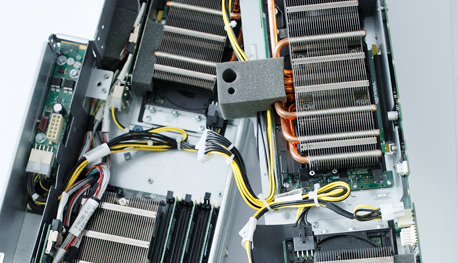Education
Mathematical and Computing Science Undergraduate MajorCurriculum
Specialized education based on a broad foundation
— a solid start for researchers and engineers
Based on their study of Computer Science and Information Literacy in the first year, students acquire basic specialized knowledge in mathematical science and computer science by taking free elective courses in the second year. From the third year onward, students build on the specialized knowledge acquired so far and deepen their understanding of mathematics, applied mathematics, and the theory and technology of computer science. Students also conduct their own research in the Independent Research Project, developing the ability to solve problems in mathematical science and computer science, and issues arising from their fusion.
-
1st Year
- 100-Level Courses
-
Students in their first year of undergraduate studies receive basic education that centers on Institute-wide compulsory courses regardless of their discipline. The 100-level courses are designed to teach common, basic skills that are required of science and technology students. The aims of these courses are to provide knowledge and cultivate the versatile intellect necessary for studying at the Institute.
-
2nd Year
3rd Year- 200-Level and 300-Level Courses
-
The 200- and 300-level courses consist of three, well-balanced specialized course categories: mathematics, applied mathematics, and computer science. The courses enable students to have a good taste in mathematical science and computing science.
-
- Mathematics
- Students develop basic mathematical thinking through courses on algebra, set, and topology. They also learn partial differential equations and discrete mathematics to acquire the specialized knowledge necessary for analyzing the mathematical structure of various phenomena.
-
- Applied Mathematics
- These courses cover the theoretical basis for applied mathematics such as probability, statistics, and mathematical optimization. Students acquire specialized knowledge including mathematical modeling and data analysis, which have valuable applications in society.
-
- Computer Science
- Students learn not only programming for software development but also acquire other specialized knowledge including algorithms and data structures, automata, and theories necessary to grasp computation (including computing) in a broad sense from a mathematical perspective.
-
-
4th Year
- 200-Level and 300-Level Courses
-
On joining a laboratory in their fourth year, students begin working on their Independent Research Project. The project serves as an inclusive milestone for students pursuing a research theme to consolidate and reinforce all the knowledge and skills acquired in their Mathematical and Computing Science Major. The Advanced Research Project also provides students with various opportunities to engage in their interests.
* The timeline depicts a standard case where students complete their bachelor's degree program in four years.
-
Entrance Examination
Students need to pass an entrance exam to advance from a bachelor's to a master's program. To advance from a master's to a doctoral program, students must pass an advancement assessment.
-
Graduate Majors
Master's Program
Doctoral Program- 400-Level, 500-Level, and 600-Level Courses
-
Students who complete the Mathematical and Computing Science Undergraduate Major may continue to study the same discipline in more depth at the graduate major level. They may also advance to the Artificial Intelligence Major, a closely related interdisciplinary graduate major.
-
- Department that offers this graduate major
-
- Mathematical and Computing Science
-
- Departments that offer this graduate major
-
- Mathematical and Computing Science/
- Computer Science
-


